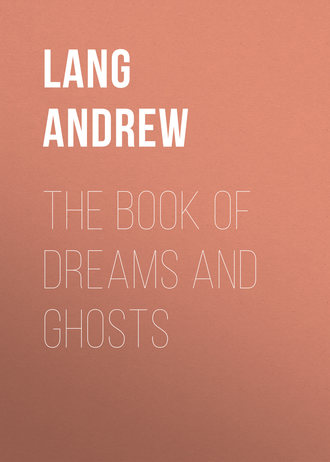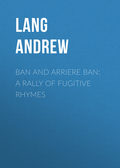
Lang Andrew
The Book of Dreams and Ghosts
DONALD BAN AND THE BOCAN 130
It is fully a hundred years ago since there died in Lochaber a man named Donald Ban, sometimes called “the son of Angus,” but more frequently known as Donald Ban of the Bocan. This surname was derived from the troubles caused to him by a bocan – a goblin – many of whose doings are preserved in tradition.
Donald drew his origin from the honourable house of Keppoch, and was the last of the hunters of Macvic-Ronald. His home was at Mounessee, and later at Inverlaire in Glenspean, and his wife belonged to the MacGregors of Rannoch. He went out with the Prince, and was present at the battle of Culloden. He fled from the field, and took refuge in a mountain shieling, having two guns with him, but only one of them was loaded. A company of soldiers came upon him there, and although Donald escaped by a back window, taking the empty gun with him by mistake, he was wounded in the leg by a shot from his pursuers. The soldiers took him then, and conveyed him to Inverness, where he was thrown into prison to await his trial. While he was in prison he had a dream; he saw himself sitting and drinking with Alastair MacCholla, and Donald MacRonald Vor. The latter was the man of whom it was said that he had two hearts; he was taken prisoner at Falkirk and executed at Carlisle. Donald was more fortunate than his friend, and was finally set free.
It was after this that the bocan began to trouble him; and although Donald never revealed to any man the secret of who the bocan was (if indeed he knew it himself), yet there were some who professed to know that it was a “gillie” of Donald’s who was killed at Culloden. Their reason for believing this was that on one occasion the man in question had given away more to a poor neighbour than Donald was pleased to spare. Donald found fault with him, and in the quarrel that followed the man said, “I will be avenged for this, alive or dead”.
It was on the hill that Donald first met with the bocan, but he soon came to closer quarters, and haunted the house in a most annoying fashion. He injured the members of the household, and destroyed all the food, being especially given to dirtying the butter (a thing quite superfluous, according to Captain Burt’s description of Highland butter). On one occasion a certain Ronald of Aberardair was a guest in Donald’s house, and Donald’s wife said, “Though I put butter on the table for you tonight, it will just be dirtied”. “I will go with you to the butter-keg,” said Ronald, “with my dirk in my hand, and hold my bonnet over the keg, and he will not dirty it this night.” So the two went together to fetch the butter, but it was dirtied just as usual.
Things were worse during the night and they could get no sleep for the stones and clods that came flying about the house. “The bocan was throwing things out of the walls, and they would hear them rattling at the head of Donald’s bed.” The minister came (Mr. John Mor MacDougall was his name) and slept a night or two in the house, but the bocan kept away so long as he was there. Another visitor, Angus MacAlister Ban, whose grandson told the tale, had more experience of the bocan’s reality. “Something seized his two big toes, and he could not get free any more than if he had been caught by the smith’s tongs. It was the bocan, but he did nothing more to him.” Some of the clergy, too, as well as laymen of every rank, were witnesses to the pranks which the spirit carried on, but not even Donald himself ever saw him in any shape whatever. So famous did the affair become that Donald was nearly ruined by entertaining all the curious strangers who came to see the facts for themselves.
In the end Donald resolved to change his abode, to see whether he could in that way escape from the visitations. He took all his possessions with him except a harrow, which was left beside the wall of the house, but before the party had gone far on the road the harrow was seen coming after them. “Stop, stop,” said Donald; “if the harrow is coming after us, we may just as well go back again.” The mystery of the harrow is not explained, but Donald did return to his home, and made no further attempt to escape from his troubles in this way.
If the bocan had a spite at Donald, he was still worse disposed towards his wife, the MacGregor woman. On the night on which he last made his presence felt, he went on the roof of the house and cried, “Are you asleep, Donald Ban?” “Not just now,” said Donald. “Put out that long grey tether, the MacGregor wife,” said he. “I don’t think I’ll do that tonight,” said Donald. “Come out yourself, then,” said the bocan, “and leave your bonnet.” The good-wife, thinking that the bocan was outside and would not hear her, whispered in Donald’s ear as he was rising, “Won’t you ask him when the Prince will come?” The words, however, were hardly out of her mouth when the bocan answered her with, “Didn’t you get enough of him before, you grey tether?”
Another account says that at this last visit of the bocan, he was saying that various other spirits were along with him. Donald’s wife said to her husband: “I should think that if they were along with him they would speak to us”; but the bocan answered, “They are no more able to speak than the sole of your foot”. He then summoned Donald outside as above. “I will come,” said Donald, “and thanks be to the Good Being that you have asked me.” Donald was taking his dirk with him as he went out, but the bocan said, “leave your dirk inside, Donald, and your knife as well”.
Donald then went outside, and the bocan led him on through rivers and a birch-wood for about three miles, till they came to the river Fert. There the bocan pointed out to Donald a hole in which he had hidden some plough-irons while he was alive. Donald proceeded to take them out, and while doing so the two eyes of the bocan were causing him greater fear than anything else he ever heard or saw. When he had got the irons out of the hole, they went back to Mounessie together, and parted that night at the house of Donald Ban.
Donald, whether naturally or by reason of his ghostly visitant, was a religious man, and commemorated his troubles in some verses which bear the name of “The Hymn of Donald Ban of the Bocan”. In these he speaks of the common belief that he had done something to deserve all this annoyance, and makes mention of the “stones and clods” which flew about his house in the night time. Otherwise the hymn is mainly composed of religious sentiments, but its connection with the story makes it interesting, and the following is a literal translation of it.
THE HYMN OF DONALD BAN
O God that created me so helpless,
Strengthen my belief and make it firm.
Command an angel to come from Paradise,
And take up his abode in my dwelling,
To protect me from every trouble
That wicked folks are putting in my way;
Jesus, that did’st suffer Thy crucifixion,
Restrain their doings, and be with me Thyself.
Little wonder though I am thoughtful —
Always at the time when I go to bed
The stones and the clods will arise —
How could a saint get sleep there?
I am without peace or rest,
Without repose or sleep till the morning;
O Thou that art in the throne of grace,
Behold my treatment and be a guard to me.
Little wonder though I am troubled,
So many stories about me in every place.
Some that are unjust will be saying,
“It is all owing to himself, that affair”.
Judge not except as you know,
Though the Son of God were awaking you;
No one knows if I have deserved more
Than a rich man that is without care.
Although I am in trouble at this time,
Verily, I shall be doubly repaid;
When the call comes to me from my Saviour,
I shall receive mercy and new grace;
I fear no more vexation,
When I ascend to be with Thy saints;
O Thou that sittest on the throne,
Assist my speaking and accept my prayer.
O God, make me mindful
Night and day to be praying,
Seeking pardon richly
For what I have done, on my knees.
Stir with the spirit of Truth
True repentance in my bosom,
That when Thou sendest death to seek me,
Christ may take care of me.
The bocan was not the only inhabitant of the spirit-world that Donald Ban encountered during his lifetime. A cousin of his mother was said to have been carried off by the fairies, and one night Donald saw him among them, dancing away with all his might. Donald was also out hunting in the year of the great snow, and at nightfall he saw a man mounted on the back of a deer ascending a great rock. He heard the man saying, “Home, Donald Ban,” and fortunately he took the advice, for that night there fell eleven feet of snow in the very spot where he had intended to stay.
We now take two modern Icelandic cases, for the purpose of leading up to the famous Icelandic legend of Grettir and Glam the Vampire, from the Grettis Saga. It is plain that such incidents as those in the two modern Icelandic cases (however the effects were produced) might easily be swollen into the prodigious tale of Glam in the course of two or three centuries, between Grettir’s time and the complete formation of his Saga.
THE DEVIL OF HJALTA-STAD 131
The sheriff writes: “The Devil at Hjalta-stad was outspoken enough this past winter, although no one saw him. I, along with others, had the dishonour to hear him talking for nearly two days, during which he addressed myself and the minister, Sir Grim, with words the like of which ‘eye hath not seen nor ear heard’. As soon as we reached the front of the house there was heard in the door an iron voice saying: ‘So Hans from Eyrar is come now, and wishes to talk with me, the – idiot’. Compared with other names that he gave me this might be considered as flattering. When I inquired who it was that addressed me with such words, he answered in a fierce voice, ‘I was called Lucifer at first, but now I am called Devil and Enemy’. He threw at us both stones and pieces of wood, as well as other things, and broke two windows in the minister’s room. He spoke so close to us that he seemed to be just at our side. There was an old woman there of the name of Opia, whom he called his wife, and a ‘heavenly blessed soul,’ and asked Sir Grim to marry them, with various other remarks of this kind, which I will not recount.
“I have little liking to write about his ongoings, which were all disgraceful and shameful, in accordance with the nature of the actor. He repeated the ‘Pater Noster’ three times, answered questions from the Catechism and the Bible, said that the devils held service in hell, and told what texts and psalms they had for various occasions. He asked us to give him some of the food we had, and a drink of tea, etc. I asked the fellow whether God was good. He said, ‘Yes’. Whether he was truthful. He answered, ‘Not one of his words can be doubted’. Sir Grim asked him whether the devil was good-looking. He answered: ‘He is far better-looking than you, you – ugly snout!’ I asked him whether the devils agreed well with each other. He answered in a kind of sobbing voice: ‘It is painful to know that they never have peace’. I bade him say something to me in German, and said to him Lass uns Teusc redre (sic), but he answered as if he had misunderstood me.
“When we went to bed in the evening he shouted fiercely in the middle of the floor, ‘On this night I shall snatch you off to hell, and you shall not rise up out of bed as you lay down’. During the evening he wished the minister’s wife good-night. The minister and I continued to talk with him during the night; among other things we asked him what kind of weather it was outside. He answered: ‘It is cold, with a north wind’. We asked if he was cold. He answered: ‘I think I am both hot and cold’. I asked him how loud he could shout. He said, ‘So loud that the roof would go off the house, and you would all fall into a dead faint’. I told him to try it. He answered: ‘Do you think I am come to amuse you, you – idiot?’ I asked him to show us a little specimen. He said he would do so, and gave three shouts, the last of which was so fearful that I have never heard anything worse, and doubt whether I ever shall. Towards daybreak, after he had parted from us with the usual compliments, we fell asleep.
“Next morning he came in again, and began to waken up people; he named each one by name, not forgetting to add some nickname, and asking whether so-and-so was awake. When he saw they were all awake, he said he was going to play with the door now, and with that he threw the door off its hinges with a sudden jerk, and sent it far in upon the floor. The strangest thing was that when he threw anything it went down at once, and then went back to its place again, so it was evident that he either went inside it or moved about with it.
“The previous evening he challenged me twice to come out into the darkness to him, and this in an angry voice, saying that he would tear me limb from limb. I went out and told him to come on, but nothing happened. When I went back to my place and asked him why he had not fulfilled his promise, he said, ‘I had no orders for it from my master’. He asked us whether we had ever heard the like before, and when we said ‘Yes,’ he answered, ‘That is not true: the like has never been heard at any time’. He had sung ‘The memory of Jesus’ after I arrived there, and talked frequently while the word of God was being read. He said that he did not mind this, but that he did not like the ‘Cross-school Psalms,’ and said it must have been a great idiot who composed them. This enemy came like a devil, departed as such, and behaved himself as such while he was present, nor would it befit any one but the devil to declare all that he said. At the same time it must be added that I am not quite convinced that it was a spirit, but my opinions on this I cannot give here for lack of time.”
In another work 132 where the sheriff’s letter is given with some variations and additions, an attempt is made to explain the story. The phenomena were said to have been caused by a young man who had learned ventriloquism abroad. Even if this art could have been practised so successfully as to puzzle the sheriff and others, it could hardly have taken the door off its hinges and thrown it into the room. It is curious that while Jon Espolin in his Annals entirely discredits the sheriff’s letter, he yet gives a very similar account of the spirit’s proceedings.
A later story of the same kind, also printed by Jon Arnason (i., 311), is that of the ghost at Garpsdal as related by the minister there, Sir Saemund, and written down by another minister on 7th June, 1808. The narrative is as follows: —
THE GHOST AT GARPSDAL
In Autumn, 1807, there was a disturbance by night in the outer room at Garpsdal, the door being smashed. There slept in this room the minister’s men-servants, Thorsteinn Gudmundsson, Magnus Jonsson, and a child named Thorstein. Later, on 16th November, a boat which the minister had lying at the sea-side was broken in broad daylight, and although the blows were heard at the homestead yet no human form was visible that could have done this. All the folks at Garpsdal were at home, and the young fellow Magnus Jonsson was engaged either at the sheep-houses or about the homestead; the spirit often appeared to him in the likeness of a woman. On the 18th of the same month four doors of the sheep-houses were broken in broad daylight, while the minister was marrying a couple in the church; most of his people were present in the church, Magnus being among them. That same day in the evening this woman was noticed in the sheep-houses; she said that she wished to get a ewe to roast, but as soon as an old woman who lived at Garpsdal and was both skilled and wise (Gudrun Jons-dottir by name) had handled the ewe, its struggles ceased and it recovered again. While Gudrun was handling the ewe, Magnus was standing in the door of the house; with that one of the rafters was broken, and the pieces were thrown in his face. He said that the woman went away just then. The minister’s horses were close by, and at that moment became so scared that they ran straight over smooth ice as though it had been earth, and suffered no harm.
On the evening of the 20th there were great disturbances, panelling and doors being broken down in various rooms. The minister was standing in the house door along with Magnus and two or three girls when Magnus said to him that the spirit had gone into the sitting-room. The minister went and stood at the door of the room, and after he had been there a little while, talking to the others, a pane of glass in one of the room windows was broken. Magnus was standing beside the minister talking to him, and when the pane broke he said that the spirit had gone out by that. The minister went to the window, and saw that the pane was all broken into little pieces. The following evening, the 21st, the spirit also made its presence known by bangings, thumpings, and loud noises.
On the 28th the ongoings of the spirit surpassed themselves. In the evening a great blow was given on the roof of the sitting-room. The minister was inside at the time, but Magnus with two girls was out in the barn. At the same moment the partition between the weaving-shop and the sitting-room was broken down, and then three windows of the room itself – one above the minister’s bed, another above his writing-table, and the third in front of the closet door. A piece of a table was thrown in at one of these, and a spade at another. At this the household ran out of that room into the loft, but the minister sprang downstairs and out; the old woman Gudrun who was named before went with him, and there also came Magnus and some of the others. Just then a vessel of wash, which had been standing in the kitchen, was thrown at Gudrun’s head. The minister then ran in, along with Magnus and the girls, and now everything that was loose was flying about, both doors and splinters of wood. The minister opened a room near the outer door intending to go in there, but just then a sledge hammer which lay at the door was thrown at him, but it only touched him on the side and hip, and did him no harm. From there the minister and the others went back to the sitting-room, where everything was dancing about, and where they were met with a perfect volley of splinters of deal from the partitions. The minister then fled, and took his wife and child to Muli, the next farm, and left them there, as she was frightened to death with all this. He himself returned next day.
On the 8th of December, the woman again made her appearance in broad daylight. On this occasion she broke the shelves and panelling in the pantry, in presence of the minister, Magnus, and others. According to Magnus, the spirit then went out through the wall at the minister’s words, and made its way to the byre-lane. Magnus and Gudrun went after it, but were received with throwings of mud and dirt. A stone was also hurled at Magnus, as large as any man could lift, while Gudrun received a blow on the arm that confined her to her bed for three weeks.
On the 26th of the month the shepherd, Einar Jonsson, a hardy and resolute fellow, commanded the spirit to show itself to him. Thereupon there came over him such a madness and frenzy, that he had to be closely guarded to prevent him from doing harm to himself. He was taken to the house, and kept in his bed, a watch being held over him. When he recovered his wits, he said that this girl had come above his head and assailed him. When he had completely got over this, he went away from Garpsdal altogether.
Later than this the minister’s horse was found dead in the stable at Muli, and the folks there said that it was all black and swollen.
These are the most remarkable doings of the ghost at Garpsdal, according to the evidence of Sir Saemund, Magnus, Gudrun, and all the household at Garpsdal, all of whom will confirm their witness with an oath, and aver that no human being could have been so invisible there by day and night, but rather that it was some kind of spirit that did the mischief. From the story itself it may be seen that neither Magnus nor any other person could have accomplished the like, and all the folk will confirm this, and clear all persons in the matter, so far as they know. In this form the story was told to me, the subscriber, to Samuel Egilsson and Bjarni Oddsson, by the minister himself and his household, at Garpsdal, 28th May, 1808. That this is correctly set down, after what the minister Sir Saemund related to me, I witness here at Stad on Reykjanes, 7th June, 1808.
GISLI OLAFSSON
* * * * *
Notwithstanding this declaration, the troubles at Garpsdal were attributed by others to Magnus, and the name of the “Garpsdale Ghost” stuck to him throughout his life. He was alive in 1862, when Jon Arnason’s volume was published.
These modern instances lead up to “the best story in the world,” the old Icelandic tale of Glam.







